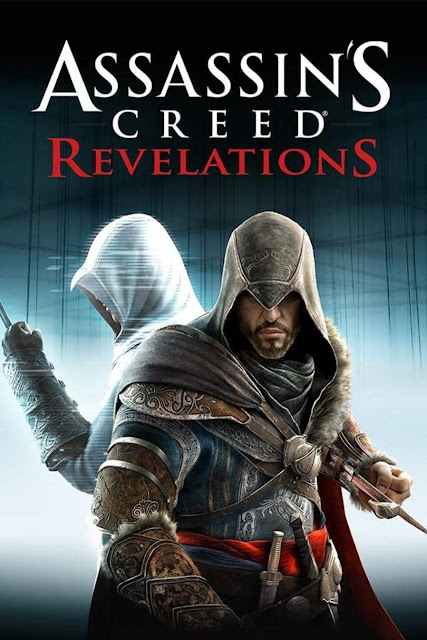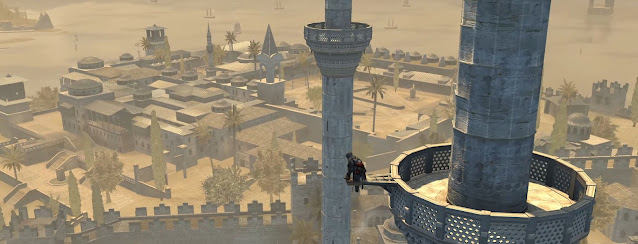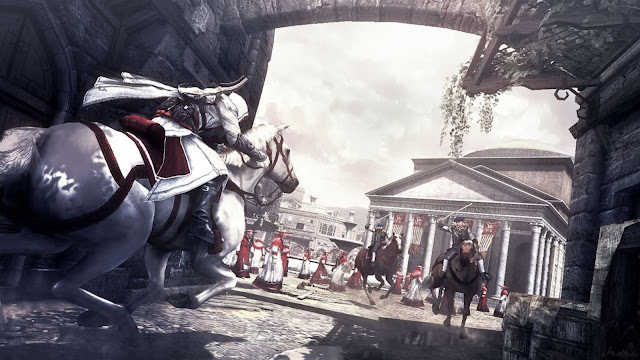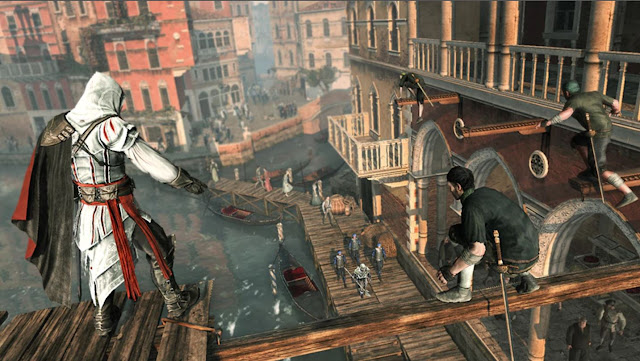For Desmond Miles (Nolan North - Uncharted) in the present day, Revelations picks up shortly after the terrible events at the end of Brotherhood. Desmond is in a coma but his mind is being supported by The Animus entirely as he follows the memories of Ezio, now a little past his prime and on his final quest to unlock the Library of Altair in Masayaf. But first he needs to find the keys in the city of Constantinople in 1512.
Constantinople is a wonderful setting for a game. It's a much more layered city than Rome and lends itself even more to the parkour staple. Much like your time in Rome in Brotherhood, you will play about 95% of the game in Constantinople and Ubisoft Montreal continued to make strides pushing even more fidelity out of their engine - although it was showing it's age when released originally. The streets were now filled with even more varied denizens and it's much more visually different from the Italian sights and sounds of the previous games, from the Turkish and Greek background noise to the brighter colours that the Byzantines pioneered in their fashion.
Gameplay is pretty understandably not changed much from the previous series entry. This is seen as a negative by many but I'd have thought changing the formula before Assassin's Creed III would have been a mistake as it really is a continuation of what's there before as opposed to a new experience. You have all the weapons and gadgets you had in Italy, obviously after going through the usual process of buying and upgrading them all again, while both fighting and movement seem very familiar to the point where the tutorial is much lighter probably suggesting that it's not for noobs to be beginning here. I was also never killed in CQC by an enemy which I put down to a familiarity with the unchanged control system spread out over 100 hours of Assassin's Creed over the past few months more than the game being easy (there are no difficulty levels). The control scheme does use different buttons here for Eagle Sense and a general context actions now which seems more fluid for the latter during gameplay.
Your new gadget is the "Hook Blade" which means that you can use the Hidden Blade as a spring loaded hook that seems to allow you to scale buildings faster with less effort which is also suggested as a plus as Ezio is viably getting on in years. The new blade also allows him to hook onto some very conveniently placed zip-lines about the city for a quick escape. Two major additions are the use of crafted throwable bombs which you gather ingredients for and use to kill/distract enemies. The other addition is a mini-game in which you defend your bases against assault by assigning resources to guard captured bases in order to prevent them falling into Templar control. The latter addition I felt was unnecessary, uninteresting, and the tutorial event felt clunky in the Revelations interface as the camera can be dodgy at the best of times. I basically never let my notoriety fall far enough to be attacked so none of the base attacks actually triggered and I literally bypassed the entire mechanic for the whole game! With regards to the bombs I found very little use for them, preferring to either use my crossbow to range enemies or use stealth to get past guards rather than bombs for distraction.
What I did enjoy was the expansion of the "Brotherhood" system where you rescue citizens, invite them to join your cause, and subsequently train them as Assassins by sending them on missions in return for XP and rewards. You are also allowed to assign five Assassins to each of about 12 cities around the world as well as maintain a pool of 12 at the ready meaning you had to rescue and train an army of about 72 to fill all available slots. I have an itch for unit micromanagement not scratched since I played MGSV so this worked and I spent over a week building my army rather than advancing the game's plot. It's a totally unnecessary time sink that doesn't do anything in the game to really aid you but I enjoyed doing it and therefore I won't apologise.
Two sections of the game are not played as Ezio. As Desmond you're on an Animus constructed island where you explore areas of puzzles as Desmond narrates your history from childhood (including voice memories from his father (John DeLancie - Star Trek: The Next Generation) up to the point where Desmond is taken from his barman job in New York by Abstergo just prior to the events depicted in the first Assassin's Creed. The narrated levels "Desmond's Memories" are jumping and construction puzzles that are so wildly out of place in the game that I couldn't enjoy them and only did half of them, watching someone silently do the reminder on YouTube.
The other memory sequences are discovered as Ezio finds the Maysaif keys in Constantinople. In these memories you play Altaïr ibn La-Ahad (Cas Anvar - The Expanse) at different periods of his later life after the first game. They serve to piece together the puzzle of how the keys were sent to Constantinople and depict both the fate of The Apple, Altaïr himself and serve as a bookend to our original protagonist's story.
Final Verdict: All good things must come to an end. While Assassin's Creed obviously continues far past this point, this is the end of The Ezio Trilogy. I think gameplay here in Revelations was the most polished and enjoyable despite the lacklustre new features added. While it's fair to say the main story to the game is the weakest, the saga of the series most beloved protagonist comes to an exciting conclusion. We also get closure for the fate of Altaïr in the game's ultimately satisfying and poignant ending.
DLC: Assassins Creed: Revelations featured three DLC packs, 2 for multiplayer maps and skins while the third was "The Lost Archive" a puzzle game inside The Animus similar to the aforementioned "Desmond's Memories" and not something I wanted to play. Therefore I also watched these on YouTube to get the whole story. Purchases of Assassin's Creed Revelations Gold Edition get all the DLC included.
Technicals: 35+ approximate hours playtime through Ubisoft Connect using a Nvidia 3070Ti @ 3440x1440 @ 175Hz with max settings on Windows 11. As with Assassin's Creed II and Brotherhood, Cutscenes force 16:9 ratio with black bars, returning to 21:9 for gameplay. Win 11 HDR provides no notable enhancement.
Bugs: Sadly there was a significant amount of crashes in Revelations, far more than the previous two games combined. There was a three of instances where the game would crash in the same place and not advance after a restart. This issue was solved by setting the processor affinity on the Revelations process in task manager to only use CPU 0 and then re-enable all processors after the sequence had resolved.
The Assassins Creed: Revelations base game is available from the Ubisoft Store or Steam for €14.99 with significant sales occasionally. The Assassin's Creed: Revelations Gold Edition was available for €19.99 at time of publication. Reviewed copy purchased from The Ubisoft Store in 2019 for €4.80.
Series Timeline [PC]:
Assassin's Creed [2007]
Assassin's Creed II [2010]
Assassin's Creed: Brotherhood [2011]
Assassin's Creed: Revelations [2011]
Assassin's Creed III [2012]
Assassin's Creed IV: Black Flag [2013]
- Assassin's Creed: Freedom Cry [2014]
- Assassin's Creed III: Liberation HD [2014]
Assassin's Creed Unity [2014]
Assassin's Creed Rogue [2015]
Assassin's Creed Syndicate [2015]
Assassin's Creed Origins [2017]
Assassin's Creed Odyssey [2018]
- Assassin's Creed III Remastered [2019]
Assassin's Creed Valhalla [2020]
Assassin's Creed Mirage [2023] .











